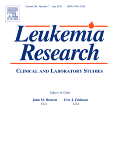
LEUKEMIA RESEARCH
Scope & Guideline
Transforming insights into impactful clinical applications.
Introduction
Aims and Scopes
- Clinical Research on Hematological Malignancies:
Investigates clinical outcomes, treatment efficacy, and safety in patients with various types of leukemia and related disorders, providing insights into real-world practices. - Molecular and Genetic Characterization:
Focuses on the identification and analysis of genetic mutations, chromosomal abnormalities, and molecular pathways involved in the pathogenesis of leukemias and myelodysplastic syndromes. - Innovative Therapeutic Strategies:
Explores novel treatment approaches including targeted therapies, immunotherapies, and combination regimens to improve patient outcomes in hematological malignancies. - Epidemiological and Population-Based Studies:
Analyzes demographic factors, treatment patterns, and survival outcomes across different populations to understand disparities in leukemia treatment and prognosis. - Translational Research:
Bridges laboratory findings with clinical applications, focusing on how basic research can lead to advancements in treatment strategies and patient management.
Trending and Emerging
- Genomic and Transcriptomic Profiling:
An increasing emphasis on using genomic and transcriptomic data to understand the molecular underpinnings of leukemias, enabling personalized medicine approaches. - Immunotherapy and CAR-T Cell Therapies:
A significant rise in studies examining the efficacy and safety of immunotherapeutic strategies, including CAR-T cell therapies, indicating a shift towards more targeted treatments. - Artificial Intelligence and Machine Learning:
Emerging applications of AI and machine learning in predicting treatment responses and outcomes in leukemia patients, showcasing a trend towards data-driven approaches. - Clonal Hematopoiesis and Its Implications:
Growing interest in the implications of clonal hematopoiesis in the development of hematological malignancies, indicating a shift towards understanding pre-leukemic states. - Patient-Centric Research and Quality of Life Studies:
An increasing focus on patient-reported outcomes and quality of life in the context of treatment for leukemia, highlighting the importance of patient perspectives in research.
Declining or Waning
- Traditional Chemotherapy Protocols:
Research focusing solely on conventional chemotherapy regimens is less prevalent as newer targeted therapies and immunotherapies gain prominence. - Generalized Risk Factors:
While risk factors for leukemias were once a major focus, recent studies have shifted towards more specific genetic and molecular insights, leading to a decline in broad epidemiological studies. - Single-Agent Treatments:
There is a noticeable decrease in studies evaluating single-agent therapies, as combination therapies and novel agents become the focus of research. - Histopathological Studies:
Research centered on traditional histopathological evaluations is being overshadowed by molecular profiling and advanced imaging techniques. - Basic Science without Clinical Relevance:
Basic research that does not have clear clinical implications or pathways to treatment is becoming less common, as journals favor studies that link laboratory findings to patient outcomes.
Similar Journals
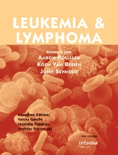
LEUKEMIA & LYMPHOMA
Advancing knowledge in blood cancer research.LEUKEMIA & LYMPHOMA is a prestigious peer-reviewed journal published by Taylor & Francis Ltd, focusing on vital research in the fields of hematology, oncology, and cancer research. With an ISSN of 1042-8194 and an E-ISSN of 1029-2403, this journal is recognized for its high-quality and impactful contributions to understanding blood cancers, with a notable impact factor reflective of its influence. Since its inception in 1989, LEUKEMIA & LYMPHOMA has continuously provided a platform for researchers and professionals to disseminate their findings, fostering advancements in diagnostic, therapeutic, and clinical strategies related to leukemias and lymphomas. The journal ranks in the Q2 category for both Hematology and Oncology research categories as of 2023, underscoring its commitment to excellence. The journal is based in the United Kingdom and serves a global audience, making it an essential resource for those dedicated to improving outcomes for patients with hematological malignancies.
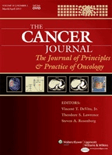
CANCER JOURNAL
Advancing Cancer Research, One Study at a Time.CANCER JOURNAL is a leading peer-reviewed publication dedicated to the dissemination of innovative research in the fields of cancer research and oncology. Published by Lippincott Williams & Wilkins, this journal serves as an essential resource for researchers, clinicians, and students seeking to advance their understanding of cancer mechanisms, treatment strategies, and patient care. With an ISSN of 1528-9117 and an E-ISSN of 1540-336X, it boasts a respectable 2023 Q2 category ranking in both Cancer Research and Oncology, reflecting its impactful contributions to the scientific community. Although it currently does not offer open access, the journal's rigorous peer-review process ensures the publication of high-quality, relevant studies that stimulate further investigation and collaboration among professionals. Since its inception, the journal has evolved through several converged years, maintaining a steadfast commitment to addressing the complexities of cancer biology and treatment. At its core, CANCER JOURNAL aims to foster advancements in oncology, making it a vital platform for sharing pivotal findings that could transform cancer research and therapeutic practices.

Hematology Reports
Bridging gaps in blood disorder treatment.Hematology Reports is an esteemed academic journal in the field of hematology, dedicated to advancing the understanding of blood disorders and their treatment. Published by MDPI, a leading Swiss publisher known for its commitment to open access since 2009, this journal provides a valuable platform for researchers and healthcare professionals to disseminate innovative findings and foster collaboration within the academic community. The journal features an array of articles ranging from clinical studies to laboratory research, and is indexed in Scopus, where it currently holds a rank of 113 out of 137 in the Medicine - Hematology category, placing it in the 17th percentile. As an open-access journal, Hematology Reports ensures that critical research is accessible to a global audience, supporting the dissemination of knowledge that has the potential to improve patient outcomes. This journal is an essential resource for those engaged in the study and treatment of hematological conditions, encouraging dialogue and the exchange of ideas to enhance clinical practices.

ACTA HAEMATOLOGICA
Driving Excellence in Blood Science ResearchACTA HAEMATOLOGICA, published by KARGER, is a prestigious journal established in 1948, dedicated to the field of hematology and related medical sciences. With an ISSN of 0001-5792 and an E-ISSN of 1421-9662, this journal stands out with a Q2 ranking in both Hematology and Miscellaneous Medicine categories as of 2023. Researchers and professionals can benefit from its high-quality peer-reviewed articles, contributing to a more profound understanding and advancement of hematological practices. Although it does not offer open access options, ACTA HAEMATOLOGICA remains an essential resource for researchers in Switzerland and worldwide, providing critical insights and fostering discourse among academic and clinical communities. The journal's address is located in the heart of Basel, Switzerland, ensuring its robust connection to European medical research networks. With a firm commitment to excellence, this publication plays a vital role in disseminating knowledge, guiding future innovations in the field.
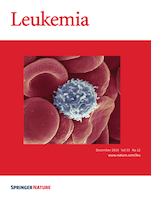
LEUKEMIA
Your Premier Source for Leukemia ResearchLEUKEMIA, published by SpringerNature, is a premier journal in the field of hematology and oncology, with ISSN 0887-6924 and E-ISSN 1476-5551. Established in 1987, this esteemed publication serves as a critical platform for disseminating groundbreaking research and comprehensive reviews on the pathophysiology, diagnosis, and treatment of leukemia and related hematological disorders. With a distinguished impact, it holds a top-tier status in several categories, including Q1 rankings in Anesthesiology and Pain Medicine, Cancer Research, Hematology, and Oncology for 2023. The journal is globally recognized for its rigorous peer-review process and is highly regarded among academia, evidenced by its impressive Scopus rankings—7th in Hematology and 24th in Oncology. Researchers, clinicians, and students alike will benefit from the rich content that this journal offers, making it an invaluable resource in the fight against leukemia. The main objective of LEUKEMIA is to advance knowledge and encourage further innovations within the field, ensuring that vital insights reach practitioners and researchers around the world.
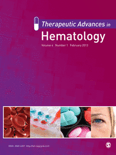
Therapeutic Advances in Hematology
Fostering collaboration for a healthier tomorrow.Therapeutic Advances in Hematology is a prestigious, peer-reviewed journal dedicated to advancing the field of hematology through innovative research and clinical studies. Published by SAGE Publications Ltd, this journal has become a vital resource for hematology professionals and researchers since its inception in 2010. With its impactful Q1 ranking in Hematology and a Scopus rank of 62 out of 137, it firmly establishes itself as a leader in disseminating significant findings and therapeutic approaches. The journal has been committed to open access since 2019, ensuring that its cutting-edge research is readily available to the global scientific community. Covering a broad scope of topics within hematology, Therapeutic Advances in Hematology is an essential platform for those seeking to enhance their understanding and implementation of therapeutic practices in hematological conditions. The journal embraces submissions from both clinical and laboratory perspectives, fostering collaboration and dialogue among researchers, clinicians, and students alike.

BLOOD REVIEWS
Pioneering insights into blood health and disease.BLOOD REVIEWS is a highly regarded journal published by Churchill Livingstone, specializing in the fields of Hematology and Oncology. With an impressive Q1 ranking in both disciplines and placing in the top 10% of its peer categories according to Scopus metrics, it provides an essential platform for the dissemination of cutting-edge research and reviews pertaining to blood disorders and cancer treatment. Since its inception in 1987 and continuing through 2024, the journal has established itself as a cornerstone for healthcare professionals, researchers, and students who seek to advance their understanding of hematologic and oncologic topics. While not an open-access journal, BLOOD REVIEWS retains a reputation for delivering high-quality, peer-reviewed articles that foster dialogue and innovation within the scientific community. For those in the United States and beyond, the journal serves as a vital resource, housed at the Journal Production Department in Edinburgh, Scotland, ensuring accessibility and a global reach in its critical academic contributions.
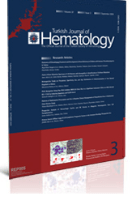
Turkish Journal of Hematology
Connecting researchers and clinicians to elevate hematology practices.Turkish Journal of Hematology is an esteemed publication dedicated to advancing the field of hematology, producing influential research since its inception in 1999 under the auspices of GALENOS PUBL HOUSE. With an Open Access model, it facilitates widespread dissemination of knowledge, allowing researchers, clinicians, and students to stay abreast of the latest developments in blood disorders and treatments. With an ISSN of 1300-7777 and an E-ISSN of 1308-5263, the journal holds a commendable position in the academic community, evidenced by its 2023 Q3 ranking within the hematology category and its standing at #80 out of 137 in the Scopus database, placing it in the 41st percentile. Covering a wide scope of topics within hematology, this journal serves as a critical resource for disseminating innovative research and clinical practices pertinent to the ongoing challenges faced in this vital area of medicine. With its continuous publication until 2024, Turkish Journal of Hematology remains a beacon for enhancing the understanding and treatment of hematological conditions within the Turkish and global medical communities.
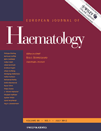
EUROPEAN JOURNAL OF HAEMATOLOGY
Pioneering Discoveries in Blood Disorders and TherapiesEUROPEAN JOURNAL OF HAEMATOLOGY, published by Wiley, serves as a vital resource for experts in the field of hematology, focusing on the latest advancements in blood disorders and therapies. With an ISSN of 0902-4441 and an E-ISSN of 1600-0609, this esteemed journal has been disseminating knowledge since 1986 and continues to thrive, converging its visionary approach through to 2024. Notably, it holds a distinguished Q2 ranking in Hematology and an impressive Q1 ranking in the broader category of Medicine (miscellaneous) as of 2023, highlighting its significant contribution to the scientific community. With a Scopus rank of #45/137 and a 67th percentile in the field, the journal is recognized for its rigorous peer-reviewed research, making it an indispensable publication for researchers, practitioners, and students aiming to stay at the forefront of hematological studies. Though not an open-access journal, it ensures broad accessibility to critical findings via its subscription model, thus fostering an informed and globally engaged audience.

ANNALS OF HEMATOLOGY
Pioneering insights in the ever-evolving field of hematology.ANNALS OF HEMATOLOGY, published by Springer in Germany, stands as a premier platform for advancing knowledge in the field of hematology and medicine at large. With a significant impact factor and recognized rankings—Q2 in Hematology and Q1 in Medicine (miscellaneous) as of 2023—this journal is pivotal for researchers, clinicians, and students who are keen on exploring the latest developments in blood disorders, treatments, and innovative methodologies. Its broad scope encompasses original research, reviews, and discussions that aim to foster interdisciplinary dialogue, ensuring that the latest findings and theories are accessible to the scientific community. Although not an open-access journal, its rigorous peer-review process guarantees high-quality contributions, thereby solidifying its reputation as a vital resource in the hematological field. Founded in 1991, the ANNALS OF HEMATOLOGY continues to evolve, converging invaluable insights from both basic and clinical research until 2024. For those dedicated to improving patient outcomes and advancing hematological science, this journal remains an essential reference.